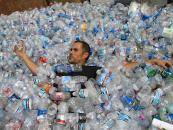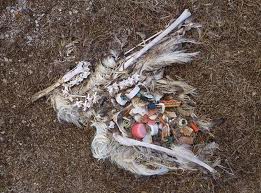In part 1 we looked at Plastic Bags. We went through the numbers and quantified how much 1 million and 1 billion is in reality. Let’s revisit that before we move onto Plastic Water Bottles.
To count straight through from 1 to 1,000,000 will take you 11 days and it will take 32 years to count to 1 billion. You cannot count to 1 trillion in your lifetime. In grains of rice, to get 1 million grains you need 25 litres (6.5 gallons). For 1 billion you need 25,000 litres of rice (6,500 gallons).
 The world now consumes 200 billion litres of bottled water every year. The majority of this is in plastic bottles. You can pretty much equate each litre into 1 bottle. So that makes 200 billion water bottles that we need to dispose of or recycle every year.
The world now consumes 200 billion litres of bottled water every year. The majority of this is in plastic bottles. You can pretty much equate each litre into 1 bottle. So that makes 200 billion water bottles that we need to dispose of or recycle every year.
How did we get to drinking this much water out of bottles when we have perfectly good water out of the taps? Well you can blame the big soda drink manufacturers. Back in the 80’s they realised that we can only drink so much soda. In order to keep growing they needed to create a new market. They decided to bottle water. They then went on a campaign to sell us, saying that bottled water is way better for us than water out of the tap. We fell for it and today it is a multi billion dollar market. We now ship water from Fiji to Italy, Italy to USA and Paris to Australia!
So is it better for us or not? Well 40% of bottled water is actually filtered tap water. Some are known to be better, some worse. No matter what water brand you buy though, there is one key that should give us the answer. It is called a ‘Used by date’. Water does not go off in rivers and lakes or in our taps so why does it have a used by date? It is because plastic water bottles contain toxins that leach into the water, contaminating it and also affecting the taste. It’s that plastic taste you get occasionally. It’s actually killing you slowly. What are these toxins? The big one is Bisphenol A (BPA). There are more and more studies these days on this toxin and it has been proven to cause breast cancer, ADHD, autism and the list continues to grow. To put it bluntly, toxins in plastic consumed during pregnancy is a major issue. Heating kids drinks and food in plastic just adds to the issue.
So it’s not healthy for us so how do they get away with it. It is all in the name of convenience. We are too lazy to take our own bottle and refill it. Tonight I saw the most crazy advert on TV. Coca Cola’s brand of water here in Australia ‘MountFranklin’ is promoting that their water is in bottles that are made of just 30% of the plastic of other brands and that they crush down really easily. Initially I thought that at least it is less plastic but then I thought about it. They use less plastic which costs them less. Win to Coca Cola. Oh and you can’t reuse it as it crushes too easy so you have to buy another bottle. Win to Coca Cola.
Around the world only 30% of plastic is recycled so that means 66.6 billion of these bottles will go into landfill or worse still, into the oceans. The caps on water bottles are still not recyclable so that means 200 billion bottle caps in our world that won’t break down, they’ll last forever.
So what can you do? Simple, buy S/S water bottles and refill them. If you want to buy water, buy it in large containers or filter it from the tap at home. S/S bottles may cost a bit but the savings you will make in not buying water will pay for this bottle countless times. It means you create less waste, you save money and the environment will love you for it. Everybody wins.
If every shop replaced the fridge they store bottled water in with a water vending machine, they still make money but don’t kill the environment. Oh and it would be cheaper for you too.
We need to change our habits today. It is the little things that count towards making our oceans safe for the future.
Say no to plastic water bottles.
REDUCE, REUSE, RECYCLE.
By Ian Thomson

